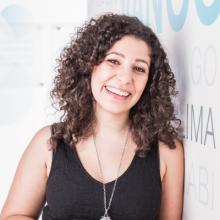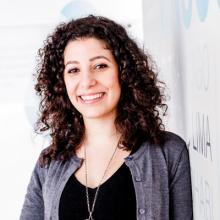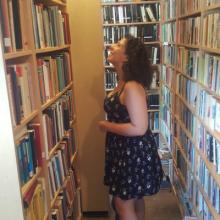Adi Burton
Why did you decide to pursue a graduate degree?
I was inspired by an ethical advocacy program for high school students that I co-created. The responses of the students, who wanted more concrete answers to the ethical problems that were raised, motivated me to stop and reflect on the program and the conversations that arose around it. The ethical, political, and educational questions that emerged formed the basis of my research project.
Why did you decide to study at UBC?
UBC is my hometown school and I felt deeply connected to the community that I became a part of during my undergraduate studies. The availability of interdisciplinary programs has continually inspired me to push my own boundaries, beginning in my undergrad and continuing into the last stage of my doctoral studies today.
What is it specifically, that your program offers, that attracted you?
ISGP offers invaluable flexibility in the creation of a graduate program, allowing me to work with faculty across departments, experiment with methodologies and writing styles, and collaborate across disciplines. Since I began with a very specific idea of what I wanted to pursue in my graduate studies, ISGP was my ideal home to gestate those ideas with the help of my interdisciplinary (and fantastic) committee.
What was the best surprise about UBC or life in Vancouver?
Grad school was full of surprises for me — from fascinating classes that reshaped my worldview to dear friends who are my partners in study and thinking. I especially appreciate the richness of conversations around decolonization, which pushed me to revisit my ideas and politics in light of the place in which I live and study.
What aspect of your graduate program do you enjoy the most or are looking forward to with the greatest curiosity?
I love the communities I have been able to join and form through grad school, whether with classmates, instructors, reading groups, or academic societies.
What do you see as your biggest challenge(s) in your future career?
I don't have any intention of moving away from Vancouver in the long term, so that is a challenge for my academic career!
How do you feel your program is preparing you for those challenges?
Interdisciplinary studies is a field (if it can be called a field) that encourages you to be creative and think outside of the boundaries that you may encounter elsewhere. Being an ISGP student means that I have developed some expertise in several disciplines and I am optimisitic that that may open some doors for me down the line.
What aspects of your life or career before now have best prepared you for your UBC graduate program?
Developing a love of reading, which I certainly got from my parents but also through friends and teachers, helped me get into the swing of things quickly — though I have learned totally new ways of reading since I began my graduate studies. Conversations around the dinner table, at the bar, or outside the cinema bring me into the world and teach me to think together with others. I was also an Arts One student in my undergrad and you certainly get a crash course in academic writing in that program (under the guidance of great teachers, too)!
What do you like to do for fun or relaxation?
I like to enjoy the Vancouver greenery and views through walks with friends and loved ones. Movies, TV, music — with partners to share and discuss — always stimulates and relaxes in equal measure. Cooking is one of my preferred mind breaks along with pilates.
What advice do you have for new graduate students?
Find people who are interested in similar things and read books with them! Meet regularly and don't cancel when you feel overwhelmed. Isolation (and its effects) is the real time sucker and demotivator, whereas I find that I can regenerate energy like crazy through conversation and intellectual curiosity. Also you find out that your problems are everyone's problems when you talk to them about it (including your supervisors and professors).


